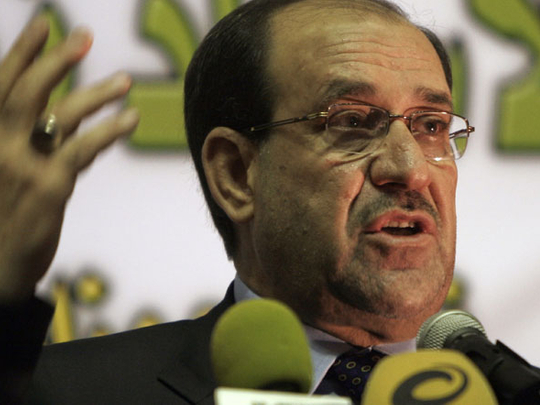
On Thursday, the Iraqi Prime Minister's Office put out a brief statement saying that he had spoken over the phone with his Syrian counterpart, Mohammad Naji Al Otari.
This was seemingly big news, being the first contact between Iraqi and Syrian officials since relations plummeted during the summer of 2009. Most observers wrote that Syria, which has been publicly sour with Nouri Al Maliki, was seemingly softening its position in order to accommodate Iranian interests in Iraq.
This simplistic view is not entirely correct. While it may have appeared that Syria was making advances to Al Maliki, in fact it was the exact opposite — the Iraqi prime minister was cuddling up to the Syrians, in effect saying: "I have mended fences with Damascus and will remain premier".
Syria, after all, can assist Al Maliki in ways that neither Iran nor Saudi Arabia could. It can mend his relationship with heavyweight Sunnis such as Tarek Al Hashemi and work on rebuilding trust between him and his former ally and now opponent, Moqtada Al Sadr. A multitude of players must sign off on any new Iraqi prime minister, and Al Sadr, who commands 40 seats in parliament, is top of the list. It is no secret that Al Sadr feels betrayed by Al Maliki, who failed during his years in power to protect the Sadrists from the US dragnet or to push for a timetable for withdrawal of US troops.
Al Maliki has tried every possible means to mend his relationship with Al Sadr, including promising him strategic Cabinet posts, but to no avail — the man still refuses to support either Al Maliki or Eyad Allawi. Perhaps Syria, which has always had Al Sadr's ear, can help the prime minister to make a breakthrough.
Additionally, Al Maliki needs the Syrians to help him improve his relationship with Iran.
Talk of Iran standing firmly behind Al Maliki — as often suggested by Allawi — is actually somewhat inaccurate. Al Maliki is indeed close to Iran, and at one point in his career he was focused on establishing an Iranian style-theocracy in Baghdad. Between 1982 and 1990 he was a guest of the Iranian government in Tehran, but most of his exile (1979-1982 and 1990-2003) was spent as a political fugitive in Syria. Unlike the Supreme Iraqi Islamic Council (SIIC), there is no proof that Al Maliki has been supported financially by the Iranians, although during the elections of 2005 he stood as a member of an Iran-backed coalition.
More recently, however, Al Maliki has distanced himself from his former allies — both in Tehran and Baghdad — to appeal to a wider Arab audience. During the provincial elections of 2009, and again during the parliamentary ones in March, he refused to stand with a wide consortium of declared Iranian allies, much to the displeasure of heavyweights in Tehran. His defection badly affected staunch Iranian proxies such as SIIC, which lost eight out of 11 provinces in 2009 and 70 out of 140 seats in 2010. Why would Iran risk pressuring one of its strongest and most strategic allies for his sake — seven months after the parliamentary elections?
Out of favour
The truth is that Iran's choice for the premiership is Adel Abdul Mahdi of SIIC, not Al Maliki. However, the former faces strong opposition from Iraq's Shiites, as well as from seasoned figures such as Al Sadr and strong contenders such as Al Maliki. Iran and Syria have too much at stake in Lebanon to risk shattering their alliance over Iraq — especially over someone like Al Maliki, who the Iranians have never been too crazy about. But if Al Maliki manages to turn over a new page with the Syrians, then perhaps his ratings will improve within the upper echelons of power in Tehran.
It will take more than a phone call, however, to rebuild trust between Al Maliki and Damascus. The Syrians feel they have been betrayed by the Iraqi prime minister. In addition to having hosted him for 16 years of his life, they helped to polish his image in the eyes of Arab and foreign dignitaries who visited Damascus between 2006 and 2009.
Two years ago, they opened an embassy in Iraq, legitimising Al Maliki in the eyes of ordinary Iraqis — especially Sunnis — who had regarded him as nothing but an American stooge, or at best an Iranian creation. He was twice received with full ceremony in the Syrian capital, and a wide array of Syrian officials visited him in Baghdad, including Al Otari and Foreign Minister Walid Al Mouallem.
Wide-ranging agreements related to oil, transport, trade and culture were signed between the Syrian government and Al Maliki's Cabinet. Rather than show gratitude, or take the blame for failing to bring security to Iraq, Al Maliki accused Syria of harbouring ex-Iraqi Baathists responsible for triple attacks in Baghdad in August 2009, which left more than 100 civilians dead.
The Syrians remain disappointed with the Iraqi premiere and there is no proof that he has changed, or would perform any better during a second term in office.
Sami Moubayed is editor-in-chief of Forward Magazine in Syria.










